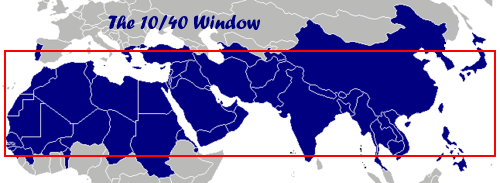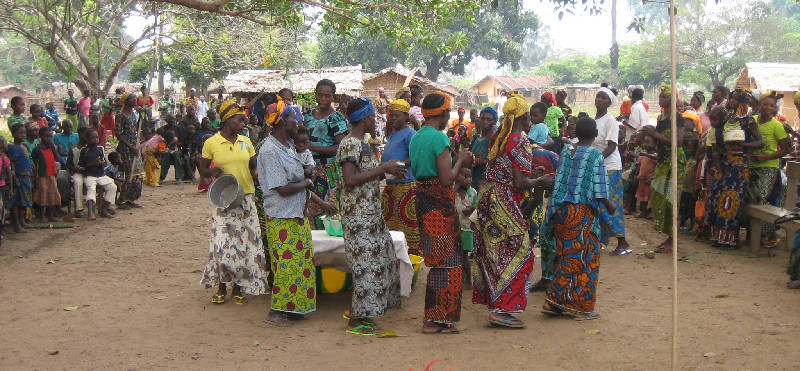Tucked away in a small mountain town, a church raises major funds to send a few of their own halfway across the world to share what they consider the greatest gift: the love and knowledge of their savior, Jesus Christ. Sounds hokey, even patronizing for a few small town folks to travel to a land where culture has been engrained in the region longer than the United States has even existed because those folks wholeheartedly believe their religious beliefs are strong and righteous and should be shared worldwide with people who haven’t come to know Jesus Christ yet. The keyword here is yet.
When someone feels as though they have discovered something great, whether it be a new song on the radio or face wash brand, they naturally feel compelled to share that discovery with their friends. No, Jesus Christ shouldn’t be compared to a song or face wash, but the concept is the same.
That very belief is why there are 400,000 missionaries sharing the gospel, or the good news, worldwide. That is why 45 billion dollars is given to mission work annually while 700 billion dollars is given to Christian causes annually according to The Traveling Team. The Traveling Team is an organization that mobilizes mission work on college campuses, getting students involved in their work.
I wrote this editorial on one of the most celebrated days of the Christian calendar: Easter Day. Outside, it rained in sheets, soaking people walking on the streets. In particular, I saw a homeless man trying to shield himself away from the rain underneath an overhang a few buildings over from where I sat, warm and dry. All while this happens, I thought of several people I personally know who were in church, celebrating the resurrection of Jesus Christ, mentally and spiritually preparing for their summer mission trips.
What I can’t help to wonder is why some people that I know, devout Christians, would rather travel to a country halfway around the world, that also might not be friendly or open to Christians, instead of working domestically, in a soup kitchen or a homeless shelter? Why do they feel called to possibly risk their life for sharing the gospel when there’s work around our own communities and neighborhoods that could be done instead?
University of the Cumberlands’ alumnus, Sara Donahue, went on a trip to Russia in 2013 for two weeks during the summer. While working in a small village with local children, teaching them about who Jesus was, Donahue said she found her trip educational and enriching for her spirit despite encountering a language barrier.
“It was eye-opening, and I learned to appreciate what I had,” Donahue said in an interview. “I also learned to appreciate their culture. People wondered why I wanted to go to Russia. If I had never gone, I would have continued thinking they were cold people, but that’s not true. I loved it there.”
Donahue and her group had toured the nearby city in order to provide a cover for their visit. Such measures were taken for their overall safety, and since their visit, safety in Russia for visitors has taken a downturn. With current conditions, Donahue said she would not return despite her desire and call to go back to Russia.
Lydia Huggins, a senior at University of the Cumberlands, took a semester off of school during her junior year for mission work. That was her third mission trip in her 22 young years on Earth, and it certainly won’t be her last.

“As a follower of Jesus, I believe that all followers are called to share the good news of Jesus – to be missionaries,” Huggins said in an interview. “Being a missionary looks different for every Christian. There are some who can share with those around them where they already live and others who are specifically called to move somewhere new to intentionally share the good news with those who have never heard. Personally, I feel led by God to do the latter.”
Huggins has done work in Europe, South Asia and Central Asia for various lengths of time. Missionaries can do short-term trips or be career missionaries, who imbed themselves in the societies for several years, living their life there while also sharing the gospel with the locals around them. Huggins’ goal: to be a career missionary after graduating college. Her “calling,” her desire to travel and spread Christianity to those untouched by it, has been a driving force in her life since she was 13-years-old.
“I suppose to some people it does seem radical to have said to God, ‘Wherever you lead, I will follow’,” Huggins said. “I truly meant that and even knew that it could mean living in a ‘dangerous’ place.”
That calling is something I never understood. Never in my life have I felt compelled to possibly risk my life or safety for a cause. I have felt compelled to help others through community outreach for homeless and impoverished individuals and families, but that never entailed pushing religion onto them. Pushing any personal beliefs onto someone, whether it be religious or political, should not be mixed in with helping others.
Huggins helped explain her reasoning, her calling to be a missionary.

“I’m not called to convert people to believe what I believe,” Huggins said. “I’m called to share the hope that I have in Jesus that no matter what awful things happen in life; I have Jesus to lean on because He is always with me.”
Although the ultimate purpose is not conversion, Huggins and other missionaries share knowledge of Christianity with hopes the “unreached” people they encounter might choose it over their religion or just adopt it if they don’t have a religion or a belief. Despite that personal belief Huggins shared, it’s contradictory to travel to another country under the guise of another purpose in order to conveniently share their beliefs.
Huggins’ beliefs are not radical or as extreme as other Christian missionaries. Albert R. Mohler is a big name in mission work, for he is the president of the Southern Baptist Theological Seminary and Joseph Emerson Brown Professor of Christian Theology. He said in an article with the Southern Equip that “with the rise of both militant Islam and the velocity of secularization in the West, Christians cannot afford to remain silent and cease proclaiming the gospel of Jesus Christ.”
This ideology and the targeted missionary zones, an area known as 10/40 window, outlines most of the unreached groups in this geographical area. It covers West Africa across Asia between 10 degrees latitude north of the equator to 40 degrees north. Nearly five billion people inhabit that area, and three billion have not been reached by Christian missionaries according to the Traveling Team.

Within that specific area, most people are of the Islamic faith or they’re nonreligious. Perhaps some of those people seek a new faith, a new god, but many do not. Many of those countries are closed to American missionaries, too, according to the Joshua Project. North Korea, Somalia, Syria, Iraq, Afghanistan, Saudi Arabia, Maldives, Pakistan, Iran and Yemen round out the top ten most dangerous countries for American missionaries, in which many are Muslim and unfriendly to Americans in general, according to Open Doors USA. All of the named countries fell within the 10/40 Window.
Even though missionaries like Huggins haven’t experienced personal dangers while overseas, she recognizes there are some dangers, which is why she can’t specify which countries she’s done missionary work in since other missionaries are still there, doing similar work. Huggins remains quiet to protect her fellow missionaries. J. B. Godfrey, a missionary who lived in the Zaire in the early 1990s, experienced near death when the country erupted into riots and looting in 1993, two years after arriving in a village called Tshene, 290 miles from the capital city of Kinshasa, where the riots started. Godfrey sent his family away when they called for evacuation, but he couldn’t fit on the little plane, so he bunkered down and waited it out, risky his life for his congregation.

“When Americans are evacuated from a country, our missionaries should leave, too, but I just couldn’t abandon my congregation,” said Godfrey, now Baptist International Missions Inc.’s executive director in an interview with Times Free Press. “BIMI does not want martyrs. When an evacuation order is given, we expect our missionaries to comply. But sometimes you just have to trust a missionary’s judgment.”
Missionaries could also encounter different threats rather than just unfriendly governments and regimes. Disease, environmental threats, wild animals, and accidents are likely to occur and cause harm to missionaries. Yet, missionaries are undeterred from any kind of threat because their calling to spread the gospel and knowledge of Jesus Christ is stronger than their fear.
According to another story featuring missionary Mary Klaus, Klaus wrote that she had done 27 mission trips in the past 11 years as of 2012. During that extensive time, she said she never encountered some of the dangers the United States State Department warned of, such as unstable governments, civil wars or terrorism in their watch-list countries, places missionaries often visit.
BIMI, the group led by Godfrey, said they had a bad encounter in Uganda after some of the leaders were accused of riling anti-gay violence. Several missionaries were assaulted and some were fired from their jobs because of the situation that induced a safety violation and violence.
“We stay clear of what those Christian groups are doing in Uganda,” BIMI President David Snyder said in an interview with the Free Times Press. “If a Ugandan Christian asked what we thought of gays, we’d advise him to consult his Bible and remember to treat everyone with love.”

Some missionaries have cited Carl Wilkens, the lone American left in Rwanda during the 1994 genocide, as justification for remaining in dangerous nations. Wilkens was a humanitarian aid worker rather than a Christian missionary, but often missionaries go to unfriendly countries with another purpose. Huggins went to teach English and work as a writer for a team, recording stories and events she encountered while in South Asia.
Doctor Kent Brantly of Indianapolis felt a calling to travel to Liberia, an epicenter of the Ebola outbreak, to treat patients and spread the love of Jesus Christ to those dying of an incurable disease. Despite the known risks, he went and contracted Ebola.
“I remember a deep sense of peace that was beyond all understanding,” Brantly said in an interview with CNN. “God was reminding me of what he had taught me years ago, that he will give me everything I need to be faithful to him.”
All of these missionaries knew and understood the risks involved in their work, and their trust in God was stronger than their fear of harm or even death. They all felt protected by God and their faith, an idea that has also been taken to more extreme levels by some groups.
Extreme Nazarene, an organization that specializes in church planting, found its purpose in building up churches in remote areas of South America. Some of those countries, despite a Catholic background, have not been friendly to Christian missionaries and church planters with the rise of drug cartels and corrupt governments, making the work they do riskier.
Far Reaching Ministries, a group that sends their missionaries to Uganda, South Sudan and Kenya, recognized the dangers people risk in those countries, including hatred, physical abuse, torture or even death.
“Those who willingly choose to follow Christ into closed counties knowing it may cost them their lives are few; such an extreme sacrifice is definitely not for the faint of heath or soft in faith,” Far Reaching Ministries posted on their Ghost Operations page of their website.
Ghost Operations started as an extra security measure after a missionary in charge of delivering money to a local pastor and his church mistakenly wired the money, which was tracked by the government and investigated. Far Reaching Ministries wrote on their site that they thanked God for bestowing wisdom upon the investigated pastor and his underground church to dodge persecution for the time being. Since that incident, the organization has taken measures to secure their operatives in dangerous countries.
Far Reaching Ministries also trains African and Middle Eastern converts to be missionaries because they are better able to imbed themselves into the harsh environments where Western missionaries would not be able to work without suspicion. Essentially, organizations such as Far Reaching Ministries and even Extreme Nazarene rely solely on their faith to protect them from harm, an idea that has always seemed contradictory to me.
Maybe I just don’t understand the concept fully because I’m not as strong in my faith as some of my friends who have done mission work. The idea of risking my life to convince others in another country that Christianity is the right religion, or the better religion, seems contradictory. As a person, I don’t think I’m an authority figure who can deem what religion is right or what beliefs are better. A calling to help people should be about helping people in dire situations, not telling them what to believe in. Just because the people of South Sudan are mostly unreached doesn’t mean reaching them will bring them a better life that has clean water, proper shelter, plenty of food, safety or education.
Humanitarian efforts can improve the living conditions for people living overseas where international missionaries work, and their lives can become better without knowing the gospel or being converted to Christianity. A balance between preaching and good works is often sought by missionaries, like Huggins, Godfrey, Dr. Brantly, Donahue and Klaus.
Missionaries who travel to do service in foreign countries go with good intentions. They want to help people and share what they love most: Jesus Christ. That desire in no means makes them bad people if their actions have negative consequences or if they fail to reach people with the gospel. Sharing the gospel shouldn’t be the most important mission in the end, and it shouldn’t be worth risking one’s life for the sake of sharing the knowledge and love you feel with Jesus Christ.
I find it surprising how strongly these missionaries feel about their calling, their undeniable desire to share Christ’s love with the unreached people on the Earth. Either way, despite the risks, Huggins sums up how most missionaries feel about their work.
“I know that no matter what occurs, whether I am put in prison or killed for my faith, God is with me and I will be with Him after this life ends,” said Huggins. “I would much rather suffer on this earth for a short time than to have to watch those around me suffer because they don’t have hope.”


